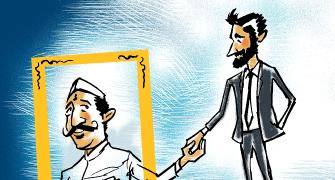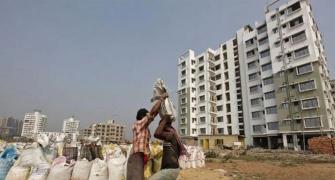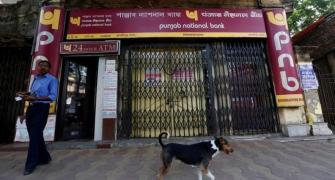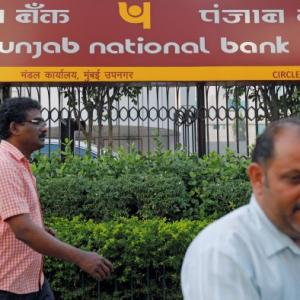'PSBs are reminiscent of the broader problem of public enterprises.'

With certain quarters demanding privatisation of public sector banks in the aftermath of the alleged fraud at Punjab National Bank (PNB), Economic Advisory Council to the Prime Minister chairman Bibek Debroy tells Sanjeeb Mukherjee, Ishan Bakshi and Indivjal Dhasmana that reducing government equity even to zero would not mean giving up of government control over these banks. Edited excerpts.
After the PNB scandal, there has been demand for privatisation of public sector banks by certain quarters. Does that merit a view?
Is there a great deal of trust in the private sector? I don’t think there is.
Public sector banks (PSBs) are reminiscent of the broader problem of public enterprises.
I do not see how the governance structure of PSBs can be improved in the present scheme of things.
It is not a question of ownership. If I were to sell a PSB with its present assets and liabilities, how many takers would there be?
Second, one must recognise that banks are not under the Companies Act but the Bank Nationalisation Act and as such, government equity has nothing to do with government control.
It is also patently obvious that there will have to be a shake-up. Some PSBs probably no longer need to exist.
We need to wait for the finance ministry to make the announcement, as it has linked recap with reforms.
Recent jobs data provide some relief to the government in the sense the figures show a surge. What is your sense of the situation?
You will never get satisfactory employment data from enterprise surveys.
There is a large amount of employment in the informal, unorganised sector and substantial self-employment in our economy.
Only way you could get satisfactory data is through household surveys.
The earlier household survey from the National Sample Survey Office goes back to 2011-12.
You won’t have credible data until probably the end of 2018 or beginning of 2019.
CMIE data show two things - one is that I am looking for a job but can’t get it and, second, that I am qualified but not opting for a job.
Many people have spent money on education.
The moment I do that, my expectation of a wage or salary goes up.
What is also probably happening is that the market isn’t offering me salaries as per my expectation and I am voluntarily opting out.
There was a big farmer protest in Maharashtra. The sector is in distress in many parts of the country. What is the solution? Is farm debt waiver a part of cure?
Generally, there is a rural bit and an agriculture bit. Construction, trade, and transportation are also sources of employment in rural areas and parts of these segments saw a temporary slowdown.
There could be some discontent because of that. Agricultural problems have been on for some time.
Within agriculture, there are land holders and agricultural labourers.
I have not seen any data from credible surveys to substantiate that suicides have been happening among agricultural labourers.
The story for the land holder is while the price of the output has been going up, the cost of input has been going up much more.
A large part of the increase on the cost side has been due to labour, not necessarily due to MGNREGA, but for many other reasons.
One needs to introduce various reforms to address these problems and the solution to all this is not to have farm loan waivers.
Post budget, there has been a lot of talk around protectionism coming back due to customs duty hikes. Is that interpretation correct?
There is nothing illegal in what has been done (hiking customs duty)… illegal in the sense of violating WTO-bound rates.
Second, trade negotiations are based on reciprocity. Why should I reduce my import duties in advance and give away a bargaining chip?
The third point is if I want to encourage manufacturing in India, I should liberalise investments, including Foreign direct investment, and I do not want imports to happen.
Fourth, we are in a period of transition, the goods and services tax (GST) process is still not complete.
Now, countervailing duty has been replaced by IGST, decided by the GST Council.
If in the process, I feel the need to change the basic customs duty, then at the logical level, what is your problem?
Now, I am not saying any of this in a protectionist sense.
What about Trump’s reciprocal tax?
These are still early days. What is already floating around is largely speculation.
I cannot see any particular reason why India should be unnecessarily alarmed just because of what the US is doing.
But obviously, if this escalates, that is bad news for not only India but everyone.
I don’t think we are at the edge of that cliff.
Do you think the Centre will be able to rope in states for ModiCare? What will be the premium that?
This is being handled by Niti Aayog and the health ministry. So, I am not going into details.
I am just flagging some issues. If I am going to use SECC (Socio Economic Caste Census), it is satisfactory on the rural side but not very on the urban side.
SECC is also dated - 2011-12. I must have a cut-off criteria, that these would be beneficiaries if I am using SECC.
This raises the point - should we use SECC or use some kind of universal health coverage where I am not going to use cut-off but I will make it tenable by limiting it to, say, general wards? There are ways of self-targeting.
There is turmoil in the bond market. What is your sense of it?
I will leave it with a statement that the bond market is a reason for worry and there are several things that need to be done.
Photograph: PTI Photo









